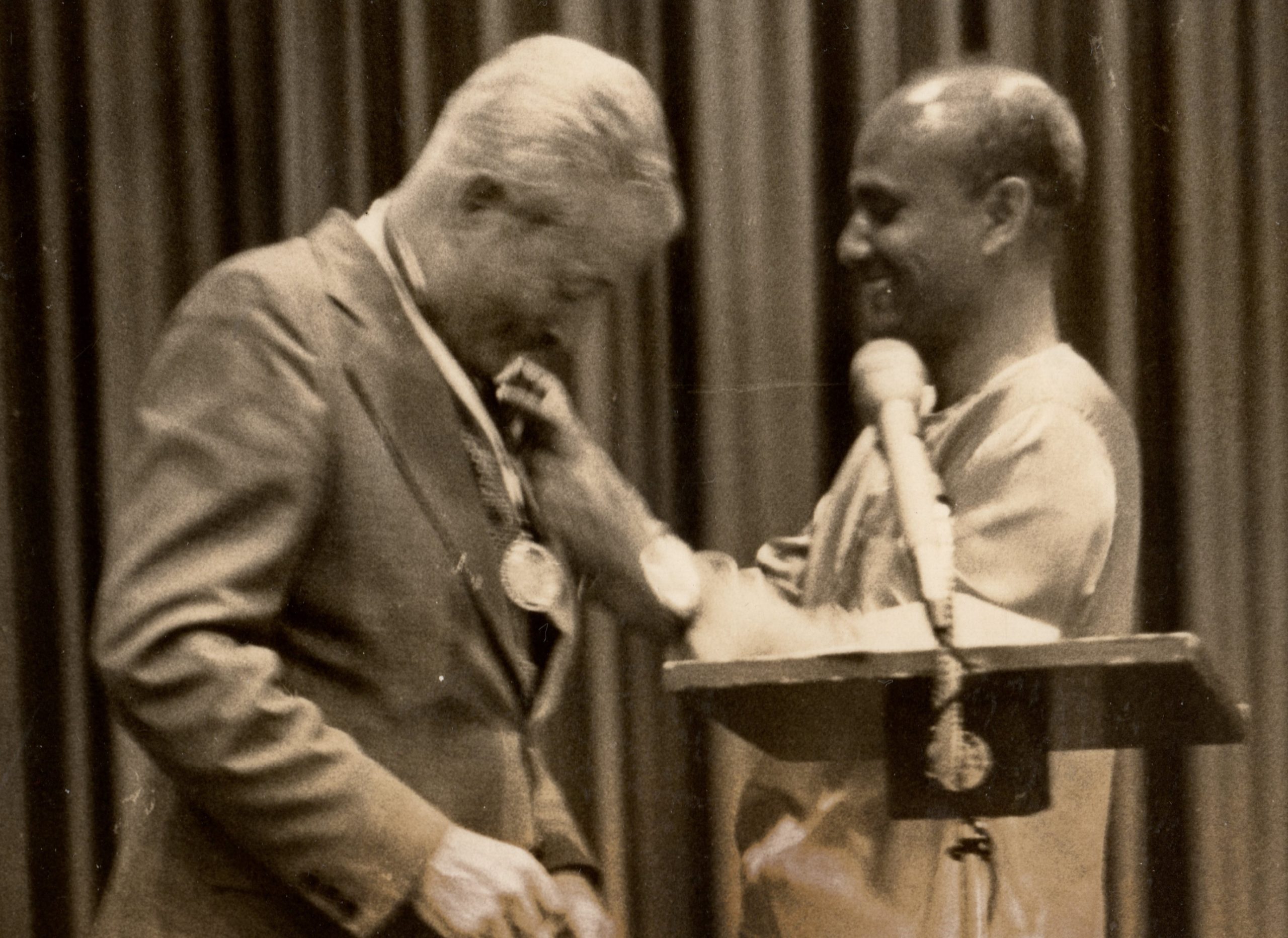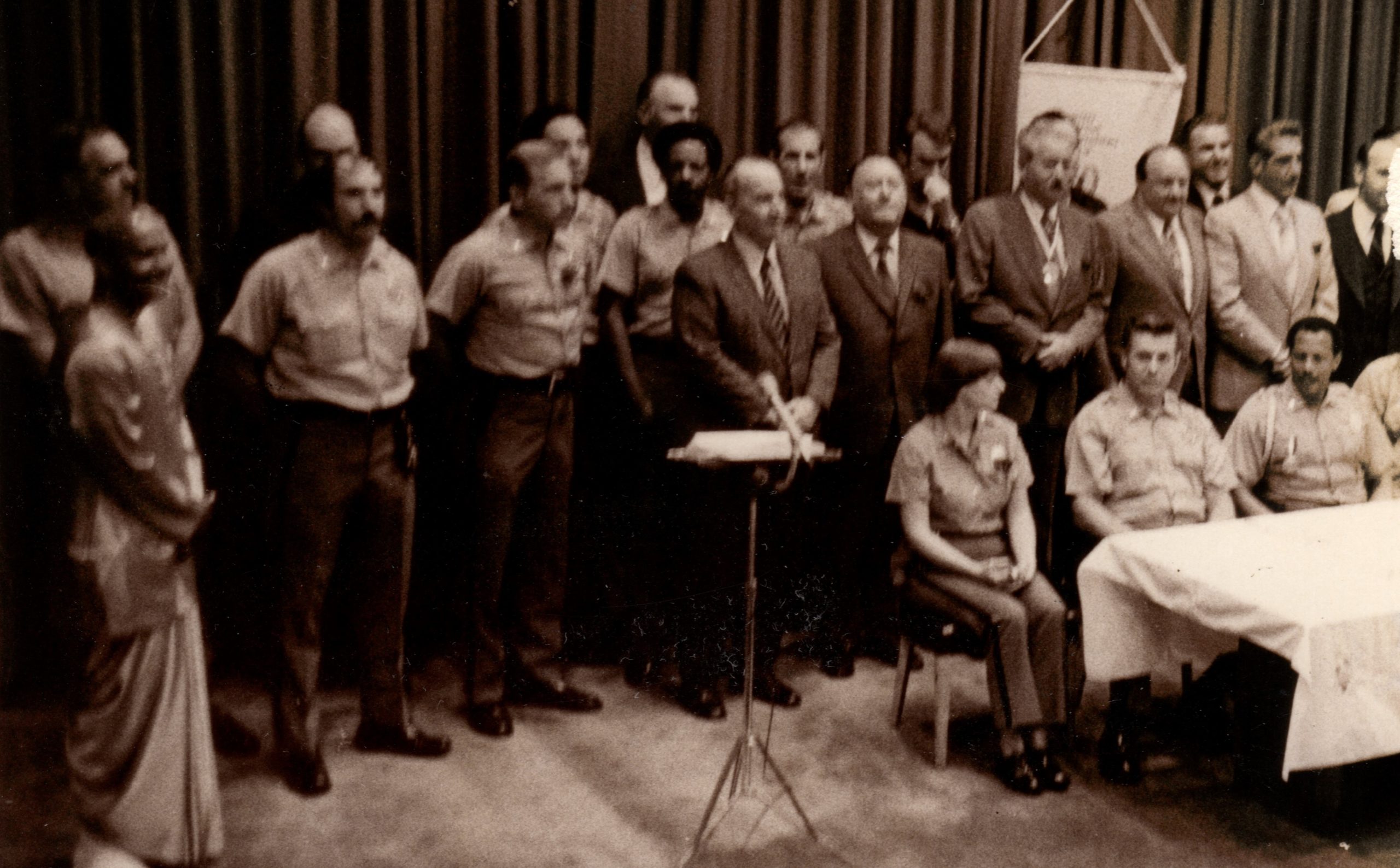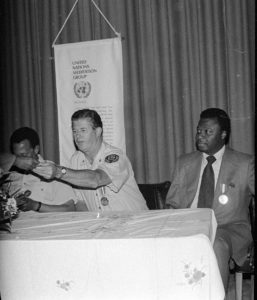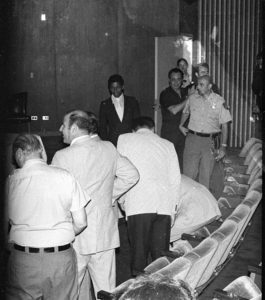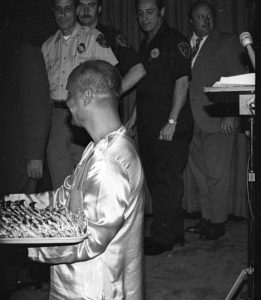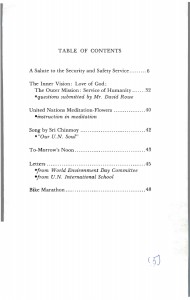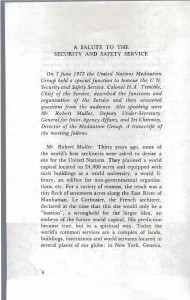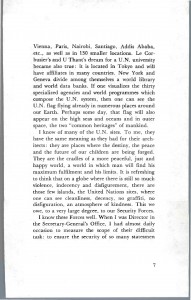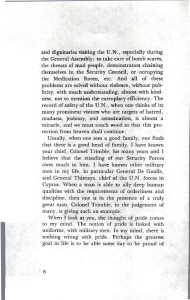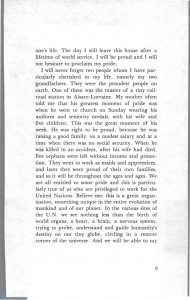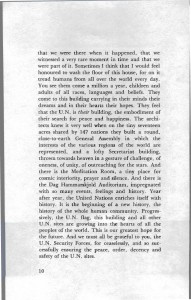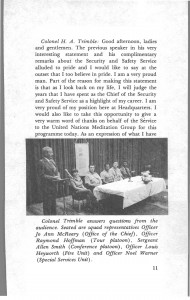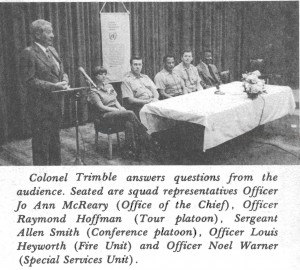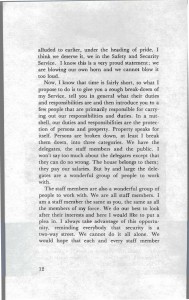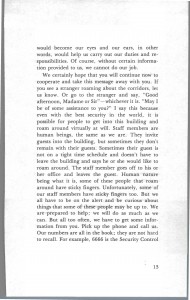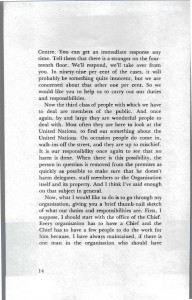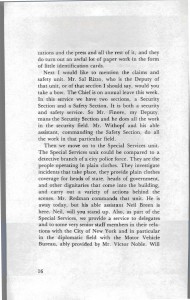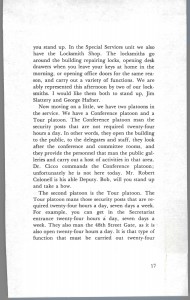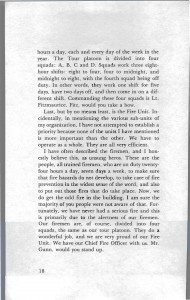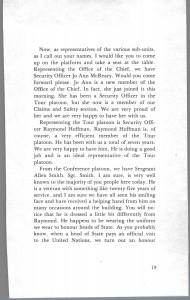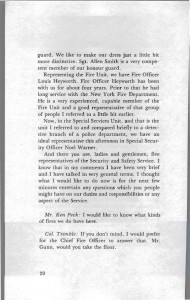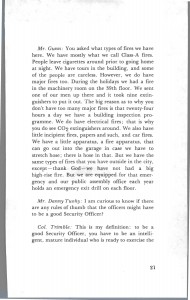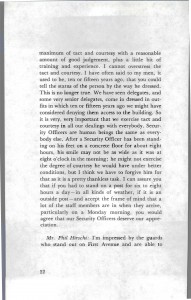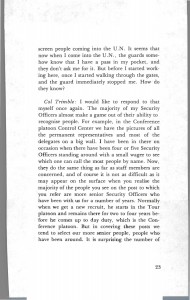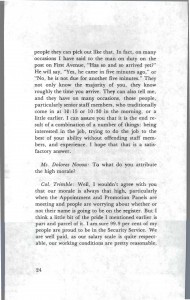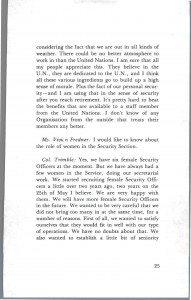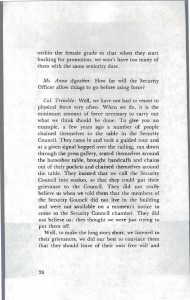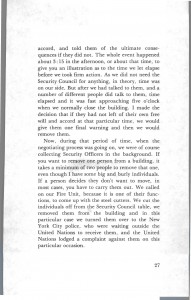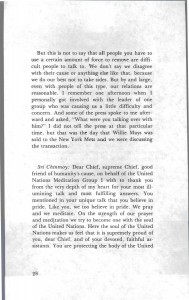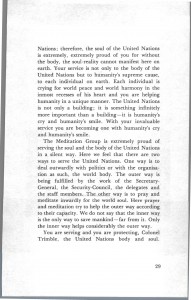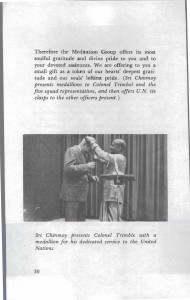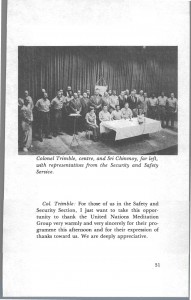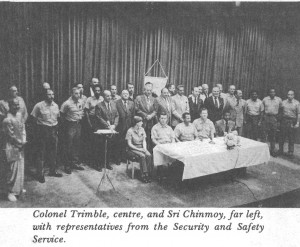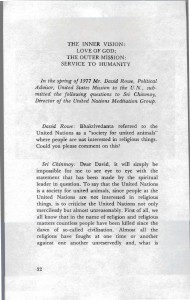A Salute to the Security and Safety Service 1977 Jun 07
Filed under Significant events & meetings | Tributes and Expressions of appreciationOn 7 June 1977, the Meditation Group at the UN held a special function to honour the UN Security and Safety Service. Colonel H. A. Trimble, Chief of the Service, described the functions and organization of the Service and then answered questions from the audience. Also speaking were Dr. Robert Muller, Deputy Under-Secretary-General, and Sri Chinmoy, Director of the Meditation Group.
Excerpts follow .
Sri Chinmoy presents Colonel Trimble with a
medallion for his dedicated service to the United
Nations.
Dr. Robert Muller: I know of many of the U.N. sites. To me, they have the same meaning as they had for their architects: they are places where the destiny, the peace and the future of our children are being forged. They are the cradles of a more peaceful, just and happy world, a world in which man will find his maximum fulfilment and his limits. It is refreshing to think that on a globe where there is still so much violence, indecency and disfigurement, there are those few islands, the United Nations sites, where one can see cleanliness, decency, no graffiti, no dis-figuration, an atmosphere of kindness. This we owe, to a very large degree, to our Security Forces.
***
Colonel H.A. Trimble : To be a good Security Officer, you ha ve to be an intelligent, mature individual who is ready to exercise the maximum of tact and courtesy with a reasonable amount of good judgment, plus a little bit of training and experience . I cannot overstress the tact and courtesy.
There could be no better atmosphere to work in than the United Na tions. I am sure that all my people appreciate this. They believe in the U.N ., they are dedicated to the U. N., and I think all these various ingredients go to build up a high sense of morale.
I am a very proud man. Part of the reason for making this statement is that as I look back on my life, I will judge the years that I have spent as the Chief of the Security and Safety Service as a highilight of my career.
***
Sri Chinmoy : Dear Chief, supreme Chief, good friend of humanity’s cause, you are protecting the body of the United Nations; therefore, the soul of the United Nations is extremely , extremely proud of you, for without the body, the soul-reality cannot manifest here on earth.
The United Nations is not only a building; it is something infinitely more important than a building-it is humanity’s cry and humanity’s
smile. With your invaluable service you are becoming one with humanity’s cry and humanity’s smile.
Colonel Trimble, centre, and Sri Chinmoy, far left. with representatives from the Security and Safety Service.
***
Link or images from book of interviews https://www.srichinmoypeacemeditationatun.org/1977/09/26/salute-to-the-united-nations-security-and-safety-service-1977-a-contents-acknowledgements/
Page Image:
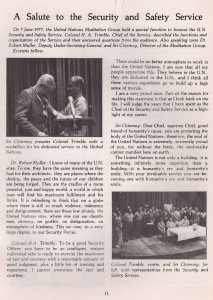 Link to text of details of speeches and questions and answers from event
Link to text of details of speeches and questions and answers from event
see also booklet :
- Salute to the United Nations Security and Safety Service 1977 (A) Contents, Acknowledgements
-
 Reception at the Jharna-Kala Gallery for the UN Community – 1977- sep-26
Reception at the Jharna-Kala Gallery for the UN Community – 1977- sep-26- Sri Chinmoy presents “A Salute to the United Nations Security and Safety Service” to Chief of U.N. Security, Colonel Trimble.
-
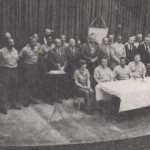 One page Summary of event
One page Summary of event - “A Salute to the United Nations Security and Safety Service”which appears in “Devoted Report to the Secretary-General 1977.
PDF of booklet of day in 8 parts:
A – bu-scpmun-1977- salute-un-security-p001-006
B – bu-scpmun-1977- salute-un-security-p007-036-event
C .1 – bu-scpmun-1977- salute-un-security-p037-075-interviews-1 interviews 1
C. 2 –bu-scpmun-1977- salute-un-security-p076-092-interviews-2 Interviews 2
C. 3 – bu-scpmun-1977- salute-un-security-p093-121-interviews-3 Interviews 3
D.1 —bu-scpmun-1977- salute-un-security-p122-153-news-1 News coverage 1
D.1 —bu-scpmun-1977- salute-un-security-p154-186-news-2 News coverage 2
E – –bu-scpmun-1977- salute-un-security-p187-192-photos Photos Conference /Tour Platoons and back cover.
Some informal photos from after the programme:
Gallery 1:
- 1977-06-14-06.
- 1977-06-14-04.jpg August 19, 20
- 1977-06-14-03
- 1977-06-14-05
Gallery 2
- bu-scpmaun-1977-06-27-vol-05-n-06-jun_Page_07.
- bu-scpmaun-1977-06-27-vol-05-n-06-jun_Page_08.
- bu-scpmaun-1977-06-27-vol-05-n-06-jun_Page_09
- bu-scpmaun-1977-06-27-vol-05-n-06-jun_Page_10
- bu-scpmaun-1977-06-27-vol-05-n-06-jun_Page_11
- bu-scpmaun-1977-06-27-vol-05-n-06-jun_Page_12
- bu-scpmaun-1977-06-27-vol-05-n-06-jun_Page_13
- bu-scpmaun-1977-06-27-vol-05-n-06-jun_Page_13-col-trimble-security
- bu-scpmaun-1977-06-27-vol-05-n-06-jun_Page_31
- bu-scpmaun-1977-06-27-vol-05-n-06-jun_Page_32
- bu-scpmaun-1977-06-27-vol-05-n-06-jun_Page_32-ckg-trimble-medallion
- bu-scpmaun-1977-06-27-vol-05-n-06-jun_Page_33
- bu-scpmaun-1977-06-27-vol-05-n-06-jun_Page_33-trimple-ckg-group.jpg
Following is the OCR text report from June 1977 Periodic Bulletin “Meditation at the UN”. The below would have some OCR garbled words cleaned up by checking the page images in the gallery above.
It is recommended for editor to copy the text into word document, remove the end line returns and run the spell checker to quickly fix some of the missed letters. etc.
A SALUTE TO THE SECURITY AND SAFETY SERVICE
On 7 June 1977 the United Nations Meditation
Group held a special function to honour the U. N.
Security and Safety Service. Colonel H.A . Trimble)
Chz”ej of the Service) descrz’bed the functz’ons and
organúatz’on of the Service and then answered
questz’ons from the audz·ence. Also speakz”ng were
Mr. Robert Muller) Deputy Under-SecretaryGeneralfor
Inter-Agency Affaz’rs) and Srz’ CMnmoy)
Dz’rector of the Medz”tatz’on Group. A transcrzpt of
the meetz’ng f ollows.
Mr. Robert Muller: Thirty years ago, sorne of
the world’s best architects were ask~d to devise a
si te for the United Nations. They plallned a world
capitallocated on 24,000 acres and equipped with
such buildings as a world university, a world library,
an edifice for non-governmental organizations,
etc. For a variety of reasons, the result was a
tiny fleck of seventeen acres along the East River of
Manhattan. Le Corbusier, the French architect,
declared at the time that this site would only be a
“bastion”, a stronghold for the larger idea, an
embryo of the future world capital. His prediction
became true, but in a spiritual way. Today the
world’s common services are a complex of lands,
buildings, institutions and world servants located in
several places of our globe: in New York, Geneva,
6
Vienna, Paris, Nairobi, Santiago, Addis Ababa,
etc., as well as in 130 smaller locations. Le Corbusier’s
and U Thant’s dream for a U.N. university
became also true: it is located in Tokyo and will
have affiliates in many countries. New York and
Geneva divide among themselves a world library
and world data banks. If one visualizes the thirty
specialized agencies and world programmes which
compose the U.N. system, then one can see the
U.N. flag flying already in numerous places around
our Earth. Perhaps sorne day, that flag will also
appear on the high seas and oceans and in outer
space, the two “common heritages” of mankind.
1 know of many of the U.N. sites. To me, they
have the same meaning as they had for their architects:
they are places where the destiny, the peace
and the future of our children are being forged.
They are the cradles of a more peaceful, just and
happy world, a world in which man will find his
maximum fulfilment and his limits. It is refreshing
to think that on a globe where there is still so much
violence, indecency and disfigurement, there are
those few islands, the United Nations sites, where
one can see cleanliness, decency. no graffiti. no
disfiguration. an atmosphere of kindness. This we
owe. to a very large degree. to our Security Forces.
1 know these Forces well. When 1 was Director in
the Secretary-Gener al’s Office. 1 had almost daily
occasion to measure the scope of their difficult
task : to ensure the security of so many statesmen
7
and dignitaries visiting the U.N., especially during
the General Assembly ; to take care of bomb scares,
the threats of mad people, demonstrators chaining
themselves in the Security Council, or occupying
the Meditation Room, etc. And all of these
problems are solved without violence, without publicity,
with much understanding, almost with kindness,
not to mention the exemplary efficiency. The
record of safety of the U. N. , when one thinks of its
many prominent visitors who are targets of hatred,
madness, jealousy, and assassination, is almost a
miracle, and we must touch wood so that this protection
from heaven shall continue.
Usually, when one sees a good family, one finds
that there is a good head of family. I have known
your chief, Colonel Trimble, for many years and I
believe that the standing of our Security Forces
owes much to him. I have known other military
men in my life, in particular General De Gaulle,
and General Thimaya , chief of the U.N. forces in
Cyprus. When a man is able to ally deep human
qualities with the requirements of orderliness and
discipline, then one is in the presence of a truly
great mano Colonel T rimble, in the judgement of
many, is giving such an example.
When I look at you, the thought of pride comes
to my mind. The notion of pride is linked with
uniforms, with military meno In my mind, there is
nothing wrong with pride. Perhaps the greatest
goal in life is to be able sorne day to be proud of
8
one’s Jife. The day I will leave this house after a
lifetime of world service, I will be proud and I will
not hesitate to proclaim my pride.
I will never forget two people whom I have particularly
cherished in my Jife, namely my two
grandfathers. They were the proudest people on
earth. One of them was the master of a tiny railroad
station in AIsace-Lorraine. My mother often
told me that his greatest moment of pride was
when he went to church on Sunday wearing his
uniform and seniority medals, with his wife and
five children. This was the great moment of his
week. He was right to be proud, because he was
raising a good family, on a modest salary and at a
time when there was no social security. When he
was killed in an accident, after his wife had died,
five orphans were left without income and protection.
They went to work as maids and apprentices,
and later they were proud of their own families,
and so it will be throughout the ages and ages. We
are all entitled to sorne pride and this is particularly
true of us who are privileged to work for the
United Nations. Believe me, this is a great organization,
something unique in the entire evolution of
mankind and of our planet. In the various si tes of
the U.N. we see nothing less than the birth of
world organs, a heart, a brain, a nervous system,
trying to pro be , understand and guide humanity’s
destiny on our tiny globe, circling in a remate
corner of the universe. And we will be able to say
9
that we were th ere when it happened, that we
witnessed a very rare moment in time and that we
were part of it. Sometimes 1 think that 1 would feel
honoured to wash the floor of this house, for on it
tread humans from aH over the world every day.
y ou see them come a million ayear, children and
adults of aH races, languages and beliefs. They
come to this building carrying in their minds their
dreams and in their hearts their hopes. T hey feel
that the U.N. is their building, the embodiment of
their search for peace and happiness. The architects
knew it very weH when on the tiny seventeen
acres shared by 147 nations they built a round,
close-to-earth General Assembly in which the
interests of the various regions of the world are
represented, and a lofty Secretariat building,
thrown towards heaven in a gesture of chaHenge, of
oneness, of unity, of outreaching for the stars. And
there is the Meditation Room, a tiny place for
cosmic interiority, prayer and silence. And there is
the Dag Hammarskjold Auditor ium , impregnated
with so many events, feelings and history. Year
after year, the United Nations enriches itself with
history. It is the beginning of a new history, the
history of the whole human community. Progressively,
the U.N. flag, this building and aH other
U.N. si tes are growing into the hearts of all the
peoples of the world. T his is our greatest hope for
the future. And we must aH be grateful to you , the
U.N. Security Forces, for ceaselessly, and so successfuHy
ensuring the peace, order, decency and
safety of the U.N. sites.
10
Colonel H. A . Trimble : Good afternoon, ladies
and gentlemen. The previous speaker in his very
interesting statement and his complimentary
remarks about the Security and Safety Service
alluded to pride and 1 would like to say at the
outset that 1 too believe in pride. 1 am a very proud
mano Part of the reason for making this statement
is that as 1 look back on my life, 1 will judge the
years that 1 have spent as the Chief of the Security
and Safety Service as a highlight of my career. 1 am
very proud of my position here at Headquarters. 1
would also like to take this opportunity to give a
very warm word of thanks on behalf of the Service
to the United Nations Meditation Group for this
programme today. As an expression of what 1 have
Colonel Tn’mble answers questions from the
audience. Seated are squad representatives Offt’cer
Jo Ann McReary (Offi’ce of the Chiej) , Offz’cer
Raymond Hoffman (Tour platoon) , Sergeant
Allen Smith (Conference platoon) , Offt’cer Louis
Heyworth (Fz’re Unit) and Offi’cer Noel Wamer
(Specz’al Servz’ces Unz’t).
11
alluded to earlier, under the heading of pride, 1
think we deserve it, we in the Safety and Security
Service. 1 know this is a very proud statement; we
are blowing our own horn and we cannot blow it
too loud.
Now, 1 know that time is fairly short, so what 1
propose to do is to give you a rough break-down of
my Service, tell you in general what their duties
and responsibilities are and then introduce you to a
few people that are primarily responsible for carrying
out our responsibilities and duties. In a nutshell,
our duties and responsibilities are the protection
of persons and property. Property speaks for
itself. Persons are broken down, at least I break
them down, into three categories. We have the
delega tes , the staff members and the publico 1
won’t say too much about the delega tes except that
they can do no wrong. The house belongs to them;
they pay our salaries. But by and large the delegates
are a wonderful group of people to work
with.
The staff members are also a wonderful group of
people to work with. We are all staff members. 1
am a staff member the same as you, the same as all
the members of my force. We do our best to look
after their interests and here 1 would like to put a
plea in. 1 always take advantage oí this opportunity,
reminding everybody that security is a
two-way street. We cannot do it all alone. We
would hope that each and every staff member
12
would become our eyes and our ears, in other
words, would help us carry out our duties and responsibilities.
Of course, without certain information
provided to us, we cannot do our jobo
We certainly hope that you will continue now to
coopera te and take this message away with you. If
you see a stranger roaming about the corridors, let
us know. Or go to the stranger and say, “Good
afternoon, Madame or Sir” – whichever it is. “May 1
be of sorne assistance to you?” 1 say this because
even with the best security in the world, it is
possible for people to get into this building and
roam around virtually at will. Staff members are
human beings, the same as we are. They invite
guests into the building, but sometimes they don’t
remain with their guests. Sometimes their guest is
not on a tight time schedule and doesn’t have to
leave the building and says he or she would like to
roam around. The staff member goes off to his or
her office and leaves the guest. Human nature
being what it is, sorne of these people that roam
around have sticky fingers. Unfortunately, sorne of
our staff members have sticky fingers too. But we
all have to be on the alert and be curious about
things that sorne of these people may be up too We
are prepared to help; we will do as much as we
can. But all too often, we have to get sorne information
from you. Pick up the phone and call uso
Our numbers are all in the book ; they are not hard
to recall. For example, 6666 is the Security Control
13
Centre. You can get an immediate response any
time. TeU them that there is a stranger on the fourteenth
floor. We’U respond, we’U take over from
you. In ninety-nine per cent of the cases, it will
probably be something quite innocent, but we are
concerned about that other one per cent. So we
would like you to help us to carry out our duties
and responsibilities.
Now the third class of people with which we have
to deal are members of the publico And once
again, by and large they are wonderful people to
deal with. Most often they are here to look at the
United Nations, to find out something about the
United Nations. On oc casio n people do come in,
walk-ins off the street, and they are up to mischief.
It is our responsibility once again to see that no
harro is done. When there is this possibility, the
person in question is removed from the premises as
quickly as possible to make sure that he doesn’t
harm delegates, staff members or the Organisation
itself and its property. And 1 think I’ve said enough
on that subject in general.
Now, what 1 would like to do is to go through my
organisation, giving you a brief thumb-nail sketch
of what our duties and responsibilities are. First, 1
suppose, 1 should start with the office of the Chief.
Every organisation has to have a Chief and the
Chief has to have a few people to do the work for
him because, 1 have always maintained, if there is
one man in the organisation who should have
14
nothing to do, it should be the Chief; it shouldn’t
be the low man on the totem-pole. 1 sit in my office
with my beautiful view of the East River and do as
litde as 1 can get away with. 1 do have a very efficient
team.
First of aH, 1 would like to introduce my Deputy,
Jim Finore. Jim, would you stand up. Jim is a
Mohican. Jim, 1 think, joined the Organisation before
it carne into being. He’s been around that
long. He goes back to Hunter College days and
there is very little about the United Nations, the
way it opera tes and certainly Security in particular
that Jim is not right on top of. He is a true expert
in his particular field.
Going along the front row, also as part of the
office of the Chief, 1 have a training and operations
officer, Mr. Goldstein. Will you take a bow.
NaturaHy, we do our best to train our security and
safety officers in the way we like things done. We
have no fat in the organisation; we have no spare
file. We are not permitted as much training as we
would like to do, but 1 can assure you that we keep
Mr. Goldstein quite busy, organising training on an
ad hoc basis, doing his best to look after USo Also as
part of the office of the Chief, we have the pass and
identification unit. Mr. Poveromo, would you take
a bow. 1 can assure you that this is a very busy
office and Mr. Poveromo runs it very efficiently.
You all know the number of staff members that a re
involved. We al so have non-governmental organi-
15
zations and the press and aH the rest of it, and they
do turn out an awful lot of paper work in the form
of little identification cards.
Next I would like to mention the claims and
safety unit. Mr. Sal Rizzo, who is the Deputy of
that unit, or of that section I should say, would you
take a bow. The Chief is on annualleave this week.
In this service we have two sections, a Security
Section and a Safety Section . It is both a security
and safety service. So Mr. Finore, my Deputy,
mans the Security Section and he does aH the work
in the security field . Mr. Withopf and his able
assistant, commanding the Safety Section, do aH
the work in that particular field.
Then we move on to the Special Services unit.
The Special Services unit could be compared to a
detective branch of a city police force. They are the
people operating in plain clothes. T hey investigate
incidents that take place, they provide plain clothes
coverage for heads of state. heads of government,
and other dignitaries that come into the building,
and carry out a variety of actions behind the
scenes. Mr. Redman commands that unit. He is
away today, but his able assistant Neil Breen is
here. Neil, will you stand up. AIso, as part of the
Special Services, we provide a service to delega tes
and to sorne very senior staff members in their relations
with the City of New York and in par ticular
in the diplomatic field with the Motor Vehicle
Bureau, ably provided by Mr. Victor Noble. Will
16
you stand up. In the Special Services unit we also
have the Locksmith Shop. The locksmiths go
around the building repairing locks, opening desk
drawers when you leave your keys at home in the
morning, or opening office doors for the same reason,
and carry out a variety of functions. We are
ably represented this afternoon by two of our locksmiths.
I would like them both to stand up, Jim
Slattery and George Hafner.
Now moving on a little, we have two platoons in
the service. We have a Conference platoon and a
Tour platoon. The Conference platoon man the
security posts that are not required twenty-four
hours a day. In other words, they open the building
to the public, to the delegates and staff, they look
after the conference and committee rooms, and
they provide the personnel that man the public galleries
and carry out a host of activities in that area.
Dr. Cicco commands the Conference platoon;
unfortunately he is not here today. Mr. Robert
Colonell is his able Deputy. Bob, will you stand up
and take a bow.
The second platoon is the Tour platoon. The
Tour platoon mans those security posts that are required
twenty-four hours a day, seven days a week.
For example, you can get in the Secretariat
entran ce twenty-four hours éi” day, seven days a
week. They also man the 48th Street Gate, as it is .
also open twenty-four hours a day. It is that type of
function that must be carried out twenty-four
17
hours a day, each and every day of the week in the
year. The Tour platoon is divided into four
squads: A, B, C and D. Squads work three eighthour
shifts: eight to four, four to midnight, and
midnight to eight, with the fourth squad being off
duty. In other words, they work one shift for five
days, have two days off, and then come in on a different
shift. Commanding these four squads is Lt.
Fitzmaurice. Fitz, would you take a bow.
Last, but by no means least, is the Fire Unit. Incidentally,
in mentioning the various sub-units of
my organization, I have not attempted to establish a
priority because none of the units 1 have mentioned
is more important than the other. We have to
operate as a whole. They are all very efficient.
1 have often described the firemen, and I honestly
believe this, as unsung heros. These are the
people, all trained firemen, who are on duty twentyfour
hours a day, seven days a week, to make sure
that fire hazards do not develop , to take care of fire
prevention in the widest sense of the word, and also
to put out those fires that do take place. Now, we
do get the odd fire in the building. I am sure the
majority of you people were not aware of that. Fortunately,
we have never had a serious fire and this
is primarily due to the alertness of our firemen.
Our firemen are, of course, divided into four
squads, the same as our tour platoon. They do a
wonderful job, and we are very proud of our Fire
Unit. We have our Chief Fire Officer with uso Mr.
Gunn, would you stand up.
18
Now, as representatives of the various sub-units,
as I call out. your names, I would like you to come
up on the platform and take a seat at the tableo
Representing the Office of the Chief, we have
Security Officer Jo Ann McReary. Would you come
forward please. Jo Ann is a new member of the
Office of the Chief. In fact, she just joined it this
morning. She has been a Security Officer in the
Tour platoon, but she now is a member of our
Claims and Safety section. We are very proud of
her and we are very happy to have her with uso
Representing the Tour platoon is Security Officer
Raymond Hoffman. Raymond Hoffman is, of
course, a very efficient member of the Tour
platoon. He has been with us a total of seven years.
We are very happy to have him. He is doing a good
job and is an ideal representative of the Tour
platoon.
From the Conference platoon, we have Sergeant
Allen Smith. Sgt. Smith, I am sure, is very well
known to the majority ofyou people here today. He
is a veteran with something like twenty-five years of
service, and I am sure we have all seen his smiling
face and have received a helping hand from him on
many occasions around the building. You will notice
that he is dressed a little bit differently from
Raymond. He happens to be wearing the uniform
we wear to honour heads of State. As you probably
know, when a head of State pays an official visit
to the United Nations, we turn out an honour
19
guardo We like to make our dress just a little bit
more distinctive. Sgt. Allen Smith is a very competent
member of Ol,lr honour guardo
Reptesenting the Fire Unit , we have Fire Officer
Louis Heyworth . Fire Officer Heyworth has been
. with us for about fOur years. Prior to that he had
long service with the New York Fire Department.
He is a very experienced,capable member of the
Fire Unit and a good representative of that group
of people 1 referrerl to a little bit earlier.
Now, in the Special Services Unit, and that is the
unit 1 referred to and compared briefly to a detective
branch of a police department, we have an
ideal representative this afternoon in Special Security
Officer Noel Warner.
And there you are, ladies and gentlemen, five
representatives of the Security and Safety Service. 1
know that in my comments 1 have been very brief
and 1 have talked in very general terms. 1 thought
what 1 would like to do now is for the next few
minutes entertain any questions which you people
might have on our duties and responsibilities or any
aspect of the Service.
Mr. Ken Peck: 1 would like to know what kinds
of fires we do have here.
Col. Trimble: If you don’t mind, 1 would prefer
for the Chief Fire Officer to answer that. Mr.
Gunn, would you take the floor.
20
Mr. Gunn: You asked what types of fires we have
here. We have mostly what we call Class-A fires.
People leave cigarettes around prior to going home
at night. We have tours in the building, and sorne
of the people are careless. However, we do have
major fires too. During the holidays we had a fire
in the machinery room on the 39th floor. We sent
one of our men up there and it took nine extinguishers
to put it out. The big reason as to why you
don’t have too many major fires is that twenty-four
hours a day we have a building inspection programme.
We do have electrical fires; that is why
you do see C02 extinguishers around. We also have
little incipient fires, papers and such, and car fires.
We have a little apparatus, a fire apparatus, that
can go out into the garage in case we have to
stretch hose; there is hose in that. But we have the
same types of fires that you have outside in the city,
except-thank God-we have not had a big
high-rise fire. But we are equipped for that emergency
and our public assembly office each year
holds an emergency exit drill on each floor.
Mr. Danny Tuohy: 1 am curious to know if there
are any rules of thumb that the officers might have
to be a good Security Officer?
Col. Tn·mble: This is my definition: to be a
good Security Officer, you have to be an intelligent,
mature individual who is ready to exercise the
21
maximum of tact and courtesy with a reasonable
amount of good judgement, plus a little bit of
training and experience. 1 cannot overstress the
tact and courtesy. 1 have often said to my men, it
used to be, ten or fifteen years ago, that you could
teH the status of the person by the way he dressed.
This is no longer true. We have seen delega tes , and
sorne very senior delegates, come in dressed in outfits
in which ten or fifteen years ago we might have
considered denying them access to the building. So
it is very, very important that we exercise tact and
courtesy in aH our dealings with everybody. Security
Officers are human beings the same as everybody
else. After a Security Officer has been standing
on his feet on a concrete floor for about eight
hours, his smile may not be as wide as it was at
eight o’clock in the morning; he might not exercise
the degree of courtesy he would have under better
conditions, but 1 think we have to forgive him for
that as it is a pretty thankless task. 1 can assure you
that if you had to stand on a post for six to eight
hours a day-in aH kinds of weather, if it is an
outside post – and accept the frame of mind that a
lot of the staff members are in when they arrive,
particularly on a Monday morning, you would
agree that our Security Officers deserve our appreciation.
Mr. Phil Hirschi: I’m impressed by the guards
who stand out on First Avenue and are able to
22
screen people coming into the U.N. It seems that
now when 1 come into the U.N. , the guards somehow
know that 1 have a pass in my pocket, and
they don’t ask me for it. But before 1 started working
here, once 1 started walking through the gates,
and the guard immediately stopped me. How do
they know?
Col Trz·mble: 1 would like to respond to that
myself once again. The majority of my Security
Officers almost make a game out of their ability to
recognise people. For example, in the Conference
platoon Control Center we have the pictures of all
the permanent representatives and most of the
delega tes on a big wall. 1 have been in there on
occasion when there have been four or five Security
Officers standing around with a small wager to see
which one can call the most people by name. Now,
they do the same thing as far as staff members are
concerned, and of course it is not as difficult .as it
may appear on the surface when you re alise the
majority of the people you see on the post to which
you refer are more senior Security Officers who
have been with us for a number of years. Nonnally
when we get a new recruit , he starts in the T our
platoon and remains there for two to four years before
he comes up to d ay duty, which is the Conference
platoon. But in covering these posts we
tend to select our more senior people, people who
have been around . It is surprising the number of
23
people they can pick out like that. In fact, on many
occasions I have said to the man on duty on the
post on First Avenue, “Has so and so arrived yet?”
He will say, “Yes, he carne in five minutes ago,” or
“No, he is not due for another five minutes.” They
not only know the majority of you, they know
roughly the time you arrive. They can also tell me,
and they have on many occasions, those people,
particularly senior staff members, who traditionally
come in at 10 : 15 or 10: 30 in the morning, or a
little earlier. lean assure you that it is the end result
of a combination of a number of things: being
interested in the job, trying to do the job to the
best of your ability without offending staff members,
and experience. I hope that that is a satisfactory
answer.
Ms. Dolores Novoa : To what do you attribute
the high morale?
Col. Trimble : Well, I wouldn’t agree with you
that our morale is always that high, particularly
when the Appointment and Promotion Panels are
meeting and people are worrying about whether or
not their name is going to be on the register. But I
think a Httle bit of the pride I mentioned earlier is
part and parcel of it. I am sure 99.9 per cent of my
people are proud to be in the Security Service. We
are well paid, as our salary scale is quite respectable,
our working conditions are pretty reasonable,
24
considering the fact that we are out in aH kinds of
weather. There could be no better atmosphere to
work in than the United Nations. 1 am sure that aH
my people appreciate this. They believe in the
U.N., they are dedicated to the U.N. , and 1 think
aH these v.arious ingredients go to build up a high
sense of moral e . Plus the fact of our personal security-
and 1 am using that in the sense of security
after you reach retirement. It’s pretty hard to beat
the benefits that are available to a staff member
from the United Nations. 1 don’t know of any
Organisation from the outside that treats their
members any better.
Ms. Vivit,n Fredner: 1 would like to know about
the role of women in the Security Section.
Col. Tn·mble: Yes, we have six female Security
Officers at the momento But we have always had a
few women in the Service, doing our secretarial
work. We started recruiting female Security Officers
a little over two years ago, two years on the
25th of May 1 believe. We are very happy with
them. We will have more female Security Officers
in the future. We wanted to be very careful that we
did not bring too many in at the same time, for a
number of reasons. First of aH, we wanted to satisfy
ourselves that they would fit in weH with our type
of operations. We have no doubts about that. We
also wanted to establish a little bit of seniority
25
within the female grade so that when they start
bucking for promotion, we won’t have too many of
them with the same seniority date.
Ms. Anne Agostzni: How far will the Security
Officer allow things to go before using force?
Col. Tn·mble: Well, we have not had to resort to
physical force very often. When we do, it is the
minimum amount of force necessary to carry out
what we think should be done. To give you an
example, a few years ago a number of people
chained themselves to the table in the Security
Council. T hey carne in and took a guided tour and
at a given signal hopped over the railing, Tan down
through the press gallery, seated themselves around
the horseshoe table, brought handcuffs and chains
out of their pockets and chained themselves around
the tableo They insisted that we call the Security
Council into session , so that they could put their
grievance to the Council. They did not really
believe us when we told them that the members of
the Security Council did not live in the building
and were not available on a moment’s notice to
come to the Security Council chamber. They did
not believe us ; they thought we were just trying to
put them off.
Well, to make the long story short, we listened to
their grievances, we did our best to convince them
that they should leave of their own free will and
26
accord, and told them of the ultimate consequences
if they did noto The whole event happened
about 3: 15 in the afternoon, or about that time, to
give you an illustration as to the time we let elapse
before we took firm action. As we did not need the
Security Council for anything, in theory, time was
on our side. But after we had talked to them, and a
number of different people did talk to them, time
elapsed and it was fast approaching five o’dock
when we normally dose the building. 1 made the
decision that if they had not left of their own free
will and accord at that particular time, we would
give them one final warning and then we would
remove them.
Now, during that period of time, when the
negotiating process was going on, we were of course
collecting Security Officers in the background. If
you want to remove one person from a building, it
takes a minimum of two people to remove that one,
even though 1 have sorne big and burly individuals.
If a person decides they don’t want to move, in
most cases, you have to carry them out. We called
on our Fire Unit, because it is one of their functions,
to come up with the steel cutters. We cut the
individuals off from the Security Council table, we
removed them from the building and in this
particular case we turned them over to the New
York City police, who were waiting outside the
United Nations to receive them, and the United
Nations lodged a complaint against them on this
particular occasion.
27
But this is not to say that all people you have to
use a certain amount of force to remove are difficult
people to talk to. We don’t say we disagree
with their cause or anything else like that, because
we do our best not to take sides. But by and large,
even with people of this type, our relations are
reasonable. 1 remember one afternoon when 1
personally got involved with the leader of one
group who was causing us a little difficulty and
concern. And sorne of the press spoke to me afterward
and asked, “What were you talking over with
him?” 1 did not tell the press at that particular
time, but that was the day that Willie Mays was
sold to the New York Mets and we were discussing
the transaction.
Sri Chinmoy : Dear Chief, supreme Chief, good
friend of humanity’s cause, on behalf of the United
Nations Meditation Group 1 wish to thank you
from the very depth of my heart for your most illumining
talk and most fulfilling answers. You
mentioned in your unique talk that you believe in
pride. Like you, we too believe in pride. We pray
and we meditate. On the strength of our prayer
and med~tation we try to become one with the soul
of the United Nations. Here the soul of the United
Nations makes us feel that it is supremely proud of
you, dear Chief, and of your devoted, faithful assistants.
You are protecting the body of the United
28
Nations; therefore, the soul of the United Nations
is extremely, extremely proud of you for without
the body, the soul-reality cannot manifest here on
earth. Your service is not only to the body of the
United Nations but to humanity’s supreme cause,
to each individual on earth. Each individual is
crying for world peace and world harmony in the
inmost recesses of his heart and you are helping
humanity in a unique manner. The United Nations
is not only a building; it is something infinitely
more important than a building-it is humanity’s
cry and humanity’s smile. With your invaluable
service you are becoming one with humanity’s cry
and humanity’s smile.
The Meditation Group is extremely proud of
serving the soul and the body of the United Nations
in a silent way. Here we feel that there are two
ways to serve the United Nations. One way is to
de al outwardly with politics or with the organisation
as such, the world body. The outer way is
being fulfilled by the work of the SecretaryGeneral,
the Security-Council, the delega tes and
the staff members. The other way is to pray and
meditate inwardly for the world soul. Here prayer
and meditation try to help the outer way according
to their capacity. We do not say that the inner way
is the only way to save mankind-far from it. Only
the inner way helps considerably the outer way.
You are serving and you are protecting, Colonel
Trimble, the United Nations body and soul.
29
Therefore the Meditation Group offers its most
soulful gratitude and divine pride to you and to
your devoted assistants, We are offering to you a
small gift as a token of our hearts’ deepest gratitu
de and our souls’ loftiest pride, (Sri Chinmoy
presents medallions to Colonel Tn’mbel and the
five squad representatz’ves) and then offers U.N, tz’e
clasps to the other offz’cers present.)
Sn’ CMnmoy presents Colonel Tn’mble wüh a
medalhon for hú dedz’cated servz’ce to the United
Nations.
30
Colonel Trz”mble, centre, and Srz” Chinmoy, far left,
wz”th representatz”ves from the Securz”ty and Safety
Servz”ce”
Col” Trz”mble: For those of us in the Safety and
Security Section, 1 just want to take this opportunity
to thank the United Nations Meditation
Group very warrnly and very sincerely for their prograrnrne
this afternoon and for their expression of
thanks toward uso We are deeply appreciative”
31
